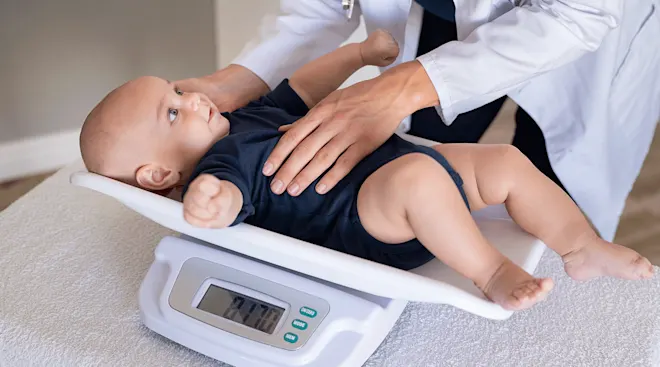What to Expect at Baby’s 4 Month Checkup
At 4 months old, baby is growing and learning new things each and every day. Your little cutie may even be on the cusp of rolling over, which is the first step in becoming more mobile. To ensure they’re growing well and hitting the anticipated milestones, your pediatrician will bring them in for their four-month checkup. Here’s what to expect at the appointment and how to best prepare.
Baby’s undoubtedly changing fast, but their four-month appointment will look pretty similar to baby’s two month checkup. According to the American Academy of Pediatrics (AAP), parents can expect their pediatrician to look at baby’s measurements, physical growth, developmental milestones, psychosocial traits and behavioral patterns. Here’s what will happen.
Physical screenings at the 4-month checkup
Like previous visits, your pediatrician will start baby’s four-month checkup by measuring their height, weight and head circumference for their growth chart. This shows the average height and weight for boys and girls in baby’s age range, explains Preeti Parikh, MD, a pediatrician in New York City. They do this at every visit to see if baby is staying within the same percentile range from checkup to checkup. “Usually, a baby roughly doubles their birth weight by 4 months, so that’ll be evaluated,” adds Denise Scott, MD, an Oklahoma-based pediatrician. Baby will also get a full physical exam, during which your pediatrician will:
- Check baby’s eyes to see how they’re tracking from side to side
- Look at the skull for any asymmetry and flat spots
- Check to see how baby’s head and their fontanelles (the soft spots on their head) are developing
- Listen to baby’s heart and lungs
- Feel their abdomen
- Check the hips for any dislocation
- Examine baby’s muscle tone
- Check baby’s “primitive reflexes”
- Examine baby’s genitalia and skin
- Place baby on their stomach to see how they lift their head and push up on their arms
- Check baby’s mouth to see if any new teeth have come in
According to the AAP, at their four-month doctor visit, your pediatrician may inquire if baby drinks anything apart from breast milk or formula to gauge their risk for developing anemia.
Along with conducting a physical exam, your pediatrician may also ask you some questions about how you’re feeling and evaluate your overall mental health and well-being. They’ll want to know if you’ve had any issues with postpartum recovery, breastfeeding, anxiety, sadness and depression or anything else concerning your mental and physical wellbeing.
Milestone assessment at 4 months
At 4 months old, baby is still learning about their surroundings by using their senses. At this age, “baby should be smiling and interactive, looking directly at a person’s face,” Scott says. “They should lift their head when prone (on their tummy), and push up with their arms to their elbows.” While baby may be rolling over, she adds not to worry if it hasn’t happened yet. Additionally, baby’s hands should now be open rather than fists, and they should be able to reach for and grab items, shake them and bring them to their mouth. “They’re also quite vocal, cooing, laughing, and screeching,” Scott adds. Below, some questions your pediatrician may ask you at the four-month checkup:
- Does baby push down with their legs and try to bear weight when you hold them up?
- What kinds of noises does baby make?
- Has baby done anything new recently?
- Does baby interact with you or others?
- Does baby smile and laugh?
- Does baby roll over?
- Does baby lift their head during tummy time? Do they push up onto their elbows?
- Do they grab objects and bring them to their mouth?
- Do you read with baby?
- Have you noticed any growth spurts?
Nutrition check-in at the 4-month checkup
Wondering if baby’s ready to start solids? While previous recommendations were to start offering cereal and baby food around this age, Scott says the new AAP recommendation is to wait until baby is about 6 months old or when showing signs of developmental readiness. Solids aside, at the four-month well child check, your pediatrician will want to know about baby’s current feeding habits. Below, some questions they may ask:
- Are you breastfeeding or using formula?
- How frequently does baby eat during the day? At night?
- How much do they eat from the bottle at each feeding?
- How long does baby nurse for at each feeding session?
- Does baby spit up after feedings?
- Has baby started drooling more? Putting their hands in their mouth?
- How many times does baby poop per day? How many wet diapers per day?
- Are you still using vitamin D and iron supplements if baby is drinking breast milk?
- Do you have any questions around teething and how to clean baby’s gums?
Sleep check-in at the 4-month checkup
Around this age, baby may start going through a bit of a sleep regression, thanks to the growth spurts they’ve been experiencing. If you’re struggling with baby’s sleep habits, be sure to bring it up with your pediatrician (keep reading for questions to ask around baby’s sleep). In the meantime, the following are some things your pediatrician will want to know about at the four-month appointment:
- What is baby’s sleep schedule like?
- How many naps does baby take?
- Has baby been waking more at night?
- What is their bedtime routine like?
- Where does baby sleep at night? During naps?
- What is baby’s sleep environment like? Does it follow safe sleep practices?
- How does baby fall asleep? Do you give them a bottle? A pacifier?
Child safety check in at the 4-month checkup
Before you know it, baby will be on the move! As exciting as this chapter is, it’s crucial to have your home and vehicles be properly baby proofed beforehand. Below, some questions your pediatrician will ask around child safety at the four-month checkup:
- Do you have any pets at home?
- Does baby have older siblings? Is your home childproofed for them?
- Who is baby’s primary caregiver? Will you be starting other childcare soon?
- Is baby still in a rear-facing car seat?
- Do you have any questions about car seat safety?
According to Parikh, baby will get the second round of the same immunizations during their four-month checkup that they did at their previous doctor visit. These include:
- Pneumococcal conjugate vaccine (PCV)
- Diphtheria, tetanus, acellular pertussis vaccine (DTaP)
- Haemophilus influenza type B vaccine (Hib)
- Inactivated polio vaccine (IPV)
- Rotavirus vaccine (given orally)
- Hepatitis B (HBV) (if the first dose was given at the previous checkup)
Similar to last time, these vaccinations may be given as combined injections, but this will vary depending on your provider’s individual practice, Scott says. She recommends bringing baby’s vaccine card to the appointment, as well as any notes around any previous reactions baby’s had following vaccination.
As baby goes through all these changes and growth spurts, it’s likely you’ll have a lot of questions on how to best support baby’s learning and development. It’s important to bring any and all questions you have to the four-month check up. “Parents should feel free to ask about anything that gives them concern,” Scott says. “They should be told whether baby’s growth is tracking properly. They should ask questions if they’re having any difficulty with their baby or if mom feels signs of depression.” Below, some questions to ask at baby’s four-month appointment:
- How can I tell if baby’s physical growth and development is on track?
- When should I introduce solids? What solids should I start with?
- Is the increase in baby’s drool normal?
- Baby blows a lot of spit bubbles—is this normal?
- When should I start reading books to baby?
- How often should baby be eating?
- How can I help baby with teething pain?
- Are amber teething necklaces safe to use? (For the record: they’re not.)
- Should I start sleep training baby?
- How can I help calm baby down when they get fussy?
Along with the above questions, Scott also says to mention if you spot any of the following red flags in baby’s development:
- Baby doesn’t smile or respond to their parents’ faces and voices
- Baby doesn’t respond to voices or noises
- Baby doesn’t track people or objects with their eyes
- Baby doesn’t seem interested in reaching for and holding objects
- Baby doesn’t seem to have enough muscle tone and appears limp
- Baby doesn’t raise their head when on their tummy
- Baby’ has hard and infrequent stools that seem painful and have blood
- Baby spits up a lot
Wondering how to prepare for baby’s four-month checkup? Scott says the best thing parents can bring is any questions or concerns they have. Scott says that helpful information to take note of prior to the visit, is how often baby feeds and how long they sleep each night. Plus, don’t forget to bring an extra change of clothes, diapers, wipes and a bottle in case there’s a long wait at the pediatrician’s office. Baby’s next checkup will be at 6 months, after which checkups will take place every three months.
“Infant checkups are a time for the parent to address concerns, and for the doctor to discuss what to expect,” Scott says. “Parents should never be silent if they are worried about their child. Your doctor doesn’t expect you to know or be able to handle everything alone—they are a great resource for you.”
Please note: The Bump and the materials and information it contains are not intended to, and do not constitute, medical or other health advice or diagnosis and should not be used as such. You should always consult with a qualified physician or health professional about your specific circumstances.
Preeti Parikh, MD, is a pediatrician with Westside Pediatrics, located in New York City, as well as a spokesperson for the American Academy of Pediatrics. She earned her medical degree from Rutgers University and completed her pediatric residency at Mount Sinai Hospital.
Denise Scott, MD, is a pediatrician with JustAnswer and a pediatric endocrinologist based in Oklahoma with over 30 years of experience. Certified in culinary medicine, Scott also runs the blog Feed Future Health and is the author of Feed Your Child’s Future Health: Prevent Disease Before It Starts. She received her medical degree from the University of Texas Medical Branch and completed her residency at the University of Oklahoma Health Sciences Center with a fellowship at the National Institutes of Health.
Healthy Children (American Academy of Pediatrics), Checkup Checklist: 4 Months Old), September 2021
Learn how we ensure the accuracy of our content through our editorial and medical review process.
Navigate forward to interact with the calendar and select a date. Press the question mark key to get the keyboard shortcuts for changing dates.





















































